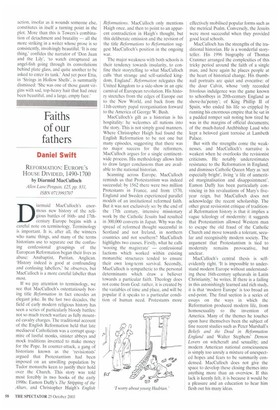Faiths of our fathers
Daniel Swift
REFORMATION: EUROPE'S HOUSE DIVIDED, 1490-1700 by Diarmid MacCulloch Allen Lane/Penguin, £25, pp. 831, ISBN 0713993707 Diarmaid MacCulloch's enormous new history of the religious battles of 16thand 17thcentury Europe begins with a careful note on terminology. Terminology is important. It is, after all, the winners who name things, and many of the terms historians use to separate out the confusing confessional groupings of the European Reformation began their lives as abuse: Anabaptist, Puritan, Anglican. 'History indeed is good at confounding and confusing labellers,' he observes, but MacCulloch is a more careful labeller than most.
If we pay attention to terminology, we see that MacCulloch's ostentatiously boring title Reformation in fact encodes an elegant joke. In the last two decades, the field of early modern religious history has seen a series of particularly bloody battles: not so much trench warfare as fully mounted cavalry charges. The traditional account of the English Reformation held that late mediaeval Catholicism was a corrupt quagmire of lustful monks, sinister abbeys and mock traditions invented to make money for the Pope. In counter-attack, a gang of historians known as the 'revisionists' argued that Protestantism had been imposed on an unwilling population by Tudor monarchs keen to justify their hold over the Church. This story was told most forcibly in two books of the early 1990s: Eamon Duffy's The Stripping of the Altars. and Christopher Haigh's English
Reformations. MacCulloch only mentions Haigh once, and then to point to an apparent contradiction in Haigh's thought, but this deliberate omission and the revision of the title Reformations to Reformation suggest MacCulloch's position in the ongoing war.
The major weakness with both schools is their tendency towards insularity, to confine their storytelling to what MacCulloch calls 'that strange and self-satisfied kingdom, England'. Reformation relegates the United Kingdom to a side-show in an epic carnival of European revolution. His history stretches from the edges of Europe out to the New World, and back from the 11th-century papal reorganisation forward to the America of George W. Bush.
MacCulloch's gift as a historian is his hospitality: he welcomes all nations into the story. This is not simply good manners. Where Christopher Haigh had found the English Reformation to be not one but many episodes, suggesting that there was no major success for the reformers, MacCulloch argues for a single continentwide process. His methodology allows him to draw larger conclusions than are available to the national historian.
Scanning across Europe, MacCulloch reminds us that Protestantism was indeed successful: by 1562 there were two million Protestants in France, and from 1570, England and Sweden experienced parallel models of an institutional reformed faith. But it was not exclusively so: by the end of the 17th century, intensive missionary work by the Catholic Jesuits had resulted in 300,000 converts in Japan. Why was the spread of reformed thought successful in Scotland and not Ireland, in northern countries and not southern? MacCulloch highlights two causes. Firstly, what he calls 'wooing the magistrate' — confessional factions which worked within existing monarchic structures tended to ensure their own long-term survival. Secondly, MacCulloch is sympathetic to the personal determinants which draw a believer towards a particular faith. Theology does not come from God: rather, it is created by the variables of time and place, and will be popular if it speaks to a particular condition of human need. Protestants more effectively mobilised popular forms such as the metrical Psalm. Conversely, the Jesuits were most successful when they provided good local schools.
MacCulloch has the strengths of the traditional historian. He is a wonderful storyteller. His 1996 biography of Thomas Cranmer arranged the complexities of this tricky period around the faith of a single man, and here again he places people at the heart of historical change. His thumbnail portraits are quiet and evocative: of the dour Calvin, whose 'only recorded frivolous indulgence was the game known to schoolboys in 20th-century England as shove-ha'penny'; of King Phillip II of Spain, who ended his life so crippled by running his enormous empire that he sat in a padded romper suit noting how tired he was in the margins of official documents; of the much-hated Archbishop Laud who kept a beloved giant tortoise at Lambeth Palace.
But with the strengths come the weaknesses, and MacCulloch's narrative is weakest when he overlooks the revisionist criticisms. He notably underestimates resistance to the Reformation in England, and dismisses Catholic Queen Mary as 'not especially bright', living 'a life of unmerited marginalisation and disappointment'. Eamon Duffy has been particularly convincing in his revaluations of Mary's fiveyear reign, but MacCulloch does not acknowledge the recent scholarship. The other great revisionist critique of traditional Reformation history is that it implies a vague teleology of modernity: it suggests that Protestantism allowed Western man to escape the old fraud of the Catholic Church and move towards a tolerant, secular and recognisably modern society. The argument that Protestantism is tied to modernity remains provocative, but unclear.
MacCulloch's central thesis is selfevidently right. 'It is impossible to understand modern Europe without understanding these 16th-century upheavals in Latin Christianity,' he writes. If there is a failing in this astonishingly learned and rich study, it is that 'modern Europe' is too broad an end-point. The final section is a series of essays on the ways in which the Reformation produced modern life, from homosexuality to the invention of America. Many of the themes he touches upon have themselves been the subject of fine recent studies such as Peter Marshall's Beliefs and the Dead in Reformation England and Walter Stephens' Demon Lovers on witchcraft and sexuality; and modern American national consciousness is simply too unruly a mixture of unexpected hopes and fears to be summarily condensed. MacCulloch does not give the space to develop these closing themes into anything more than an overview. If this lack is keenly felt, it is because it would be a pleasure and an education to hear him flesh out his many ideas.


































































































 Previous page
Previous page